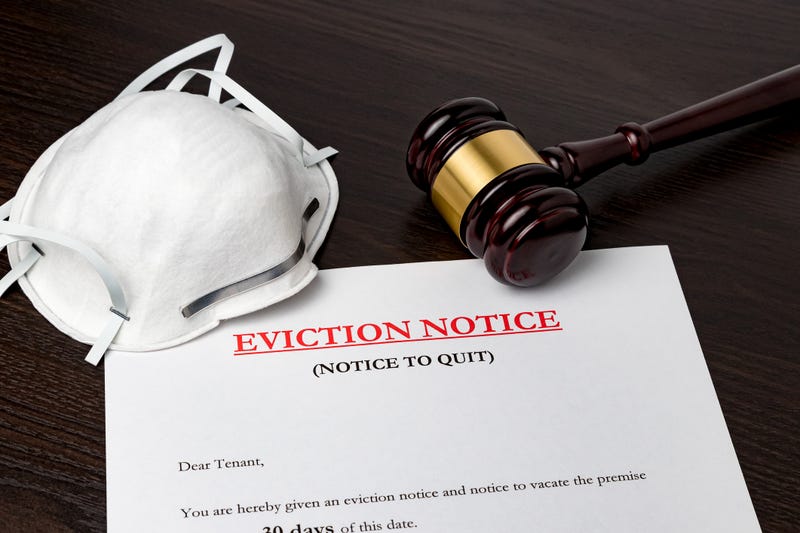
CHICAGO (WBBM NEWSRADIO) -- Chicago landlords with tenants behind on rent can file to have them evicted starting Sunday, ahead of the end of pandemic-related protections at the end of August.
The State of Illinois has announced a "step-down plan" that will allow landlords to file eviction proceedings starting Aug. 1 on renters covered under the moratorium; but enforcement of the filing will not begin until the moratorium ends on Aug. 30. So now, the City of Chicago is reminding renters there are resources available to help them avoid housing instability stemming from shutdowns established to prevent the further spread of COVID-19.
"As this moratorium approaches its end, it is imperative that we remind our residents of the range of rental supports we still have in place to ensure they are able to stay in their homes," said Mayor Lightfoot, in a statement. "After all, we still have a ways to go before we can officially turn the page on COVID-19—meaning that until and well after that day comes, we have a responsibility to protect and uplift residents who are struggling to make ends meet. I strongly encourage any of our renters who are still facing challenges with paying their rent to tap into the multitude of resources we have available and get the relief they deserve."
Direct Financial Assistance
The Chicago Department of Housing (DOH) closed applications on its latest round of direct financial assistance to impacted renters on June 15 after receiving over 26,000 applications. The Emergency Rental Assistance Program (ERAP) is providing up to 15 months of rental payments, 12 months of past due payments and three months of future payments, along with utility payment assistance. DOH is currently processing applications and distributing funds.
The Chicago Department of Family and Support Services (DFSS) operates a Rental Assistance Program (RAP) that provides short-term financial assistance for rent, utilities, arrears, and other costs related to housing stability. In addition to financial assistance, households receive housing stability case management focused on budgeting and resolving issues that contributed to the initial housing crisis. Residents can visit any of the six Community Service Centers listed at www.chicago.gov/fss to apply.
Renter Protections
Under the COVID-19 Evictions Protection Ordinance, landlords filing evictions due to nonpayment of rent against tenants who have coronavirus-related financial hardships, to wait for a seven-day “cooling-off” period in addition to the regular five-day notice period. After the “cooling-off” period, landlords must show the court that they have engaged in good faith efforts to reach a reasonable alternative to eviction, including mediation, payment plans, or other options before an eviction can proceed.
Under the Fair Notice Act passed by City Council in May 2020, tenants have the right to cure a default by repaying past due rent in full along with filing fees and costs incurred by the landlord, until a judgment order has been ruled.
Free Mediation and Legal Assistance
Last year, DOH implemented a comprehensive #KnowYourRights campaign to inform renters of their rights when it comes to illegal evictions and lockouts. Under the Chicago Residential Landlord Tenant Ordinance (Municipal Code Section 5-12-160), lockouts, which include actions such as changing locks, blocking entrances, removing doors and windows, utility shutoffs, removing personal property, and any other act that makes the property inaccessible or uninhabitable, are illegal.
Through a partnership with the Lawyers’ Committee for Better Housing, renters can receive free legal and mitigation assistance to prevent being evicted. The hotline, Rentervention, is free and confidential, and tenants can call 312-347-7600, visit rentervention.com or text “hi” to 866-7RENTER (866-773-6837) to start a conversation with Renny, Rentervention’s bot.
Additionally, earlier this year, DOH also worked with the Chicago Police Department (CPD) to establish a new lockout code for illegal lockouts and all 911 operators were trained on the protocol to ensure that officers have the proper response to prevent vulnerable residents from being locked out of their homes. In addition to assigning a unit, dispatchers also notify other support services (i.e., emergency medical, shelter, etc.,) or field units as the situation dictates.
The Center for Conflict Resolution (CCR) also works to help minimize the number of post-pandemic evictions. For the past 40 years, CCR has been providing free mediation services to parents, families, youth, schools, landlords, tenants, religious institutions, and others. Each year, CCR conducts nearly 1,600 mediations across the City and County, including over 200 eviction-related mediations largely referred by the courts. In the last 10 years, 63 percent of CCR eviction mediations have resulted in settlements between landlords and tenants. A court case is not required to access mediation. Clients can also self-refer outside of the court process. Contact CCR’s case management team at 312-922-6464, ext. 22 or newcase@ccrchicago.org if you would like to open a mediation case.
Additionally, the Cook County Legal Aid for Housing and Debt (CCLAHD) offers free legal help, mediation, and connections to other resources including rental assistance. To learn more, residents can call 855-956-5763 or visit https://cookcountylegalaid.org.
For more information about resources for renters facing possible eviction, visit chicago.gov/eviction.


